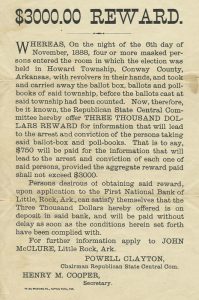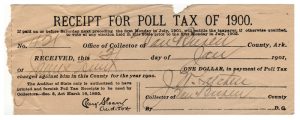calsfoundation@cals.org
Newsworthy Then and Now: Election Fraud
Here’s the truth about election fraud—it’s always been the means by which entrenched elites hold on to their power. Election fraud entails not only the devious misuse of ballot boxes but also acts of violence with the goal of intimidating certain groups of voters. And, if successful, election fraud ends up allowing its perpetrators to enact its aims into official policy. The Arkansas experience highlights this reality quite well.

In July 1888, the state of Arkansas essentially supported a coup d’état in the eastern Arkansas county of Crittenden, which was about eighty percent African American at the time. There, alliances between the Republican Party and the Union Labor Party essentially locked the white, planter-dominated Democratic Party out of power. Local Democrats, fearing further erosion of their power come the fall election, arranged to indict the Black county judge and county clerk on charges of public drunkenness, which would result in their removal from office.

Then, on the morning of July 12, prominent white citizens, under the pretext of reacting to threats contained in anonymous letters, rounded up the other Black elected officials and marched them across the bridge to Memphis under threat of death if they returned. As one member of the mob shouted, “God damn you, you’ve got to leave this county, this is a white man’s government and we are tired of Negro dominance; we have been planning this for the past two years, and no more Negroes or Republicans shall hold office in this county.” A second expulsion targeted other prominent African Americans, including landowners, educators, and ministers.
A few days later, county clerk David Ferguson and others made their way to Little Rock and appealed to Governor Simon P. Hughes for protection so that they could return to Crittenden County and resume their rightful positions. However, Governor Hughes, instead, chose to fill all vacant county offices with white Democrats. These Democrats, in turn, appointed only their fellow Democrats to be county judges—never mind that this was a majority Republican county.
Despite their efforts, during the September election, the candidate of the Union Labor Party, Charles M. Norwood, carried the county. However, he still lost the election to Democrat James. P. Eagle in a statewide election marked by rampant fraud—so rampant that many historians believe Norwood to have been the rightful winner of the governorship. In fact, the congressional candidate Lewis Featherstone appealed his loss in the November election to Congress, which held hearings and determined that Featherstone’s opponent, William Henderson Cate, had been declared the winner only due to massive fraud—especially the appointment of those election judges in Crittenden County, given that state law required such judges to represent different political parties.
In that same election, Republican John Middleton Clayton was cheated of his own congressional victory (losing by a margin of 846 votes in Arkansas’s second district) due to fraud, including masked gunmen attacking a majority Black voting precinct in Conway County and stealing the ballot box. He was investigating matters in Plumerville when he was assassinated on January 29, 1889.
Arkansas’s next statewide elections were just as close and just as fraudulent, but at this point the Republicans and their Union Labor allies were in even less of a position to launch any challenges to the results than they had been before. And so in 1891, the Democratic Party passed a new election law that centralized control over the voting process and enacted an indirect literacy test for voters. This resulted in a severe decline in Black voting across the state, thus taking away a key Republican constituency, as it was designed to do. And then the next year, the state approved a regressive poll tax, further depleting the ranks of voters from those groups that might challenge the ruling Democratic Party. Thus was one-party rule ensured in Arkansas for more than seventy years.
This is the nature of election fraud. It is perpetrated by entrenched groups who fear a loss of their own power. And when, through rampant fraud, they are able to solidity their own positions, despite representing a minority of the citizenry, they turn around and try to achieve with the levers of legislation the same goals they previously pursued through vigilante violence—namely, to depress voting.
Are you registered to vote?
By Guy Lancaster, editor of the CALS Encyclopedia of Arkansas




